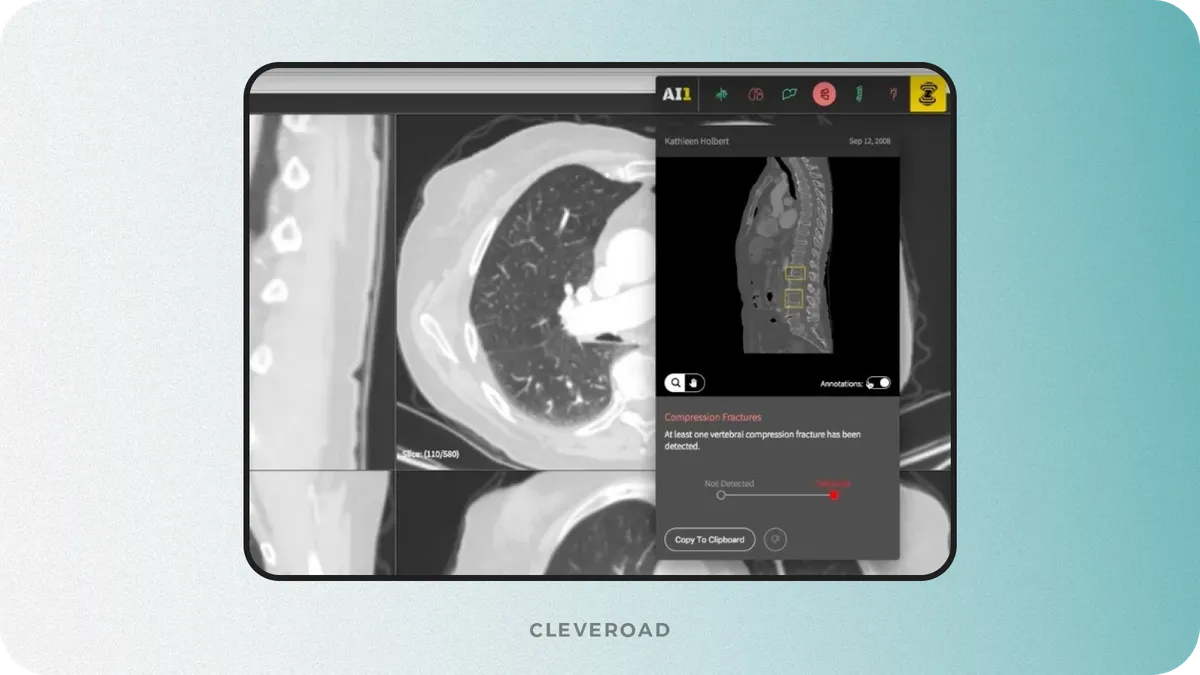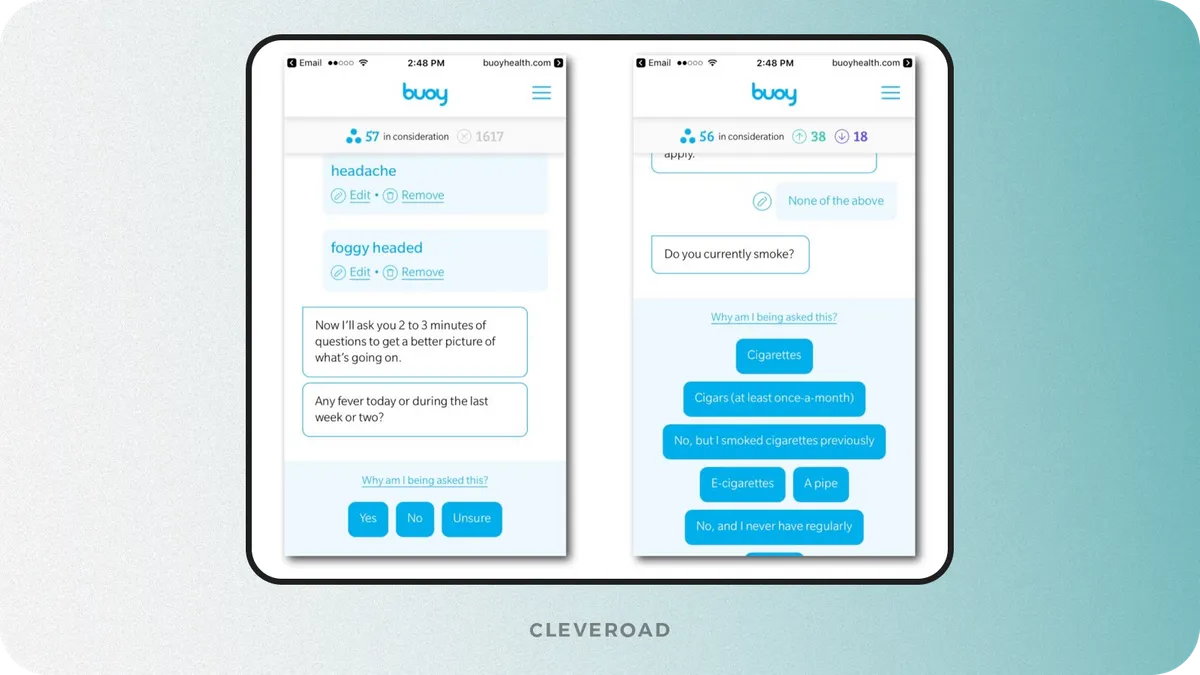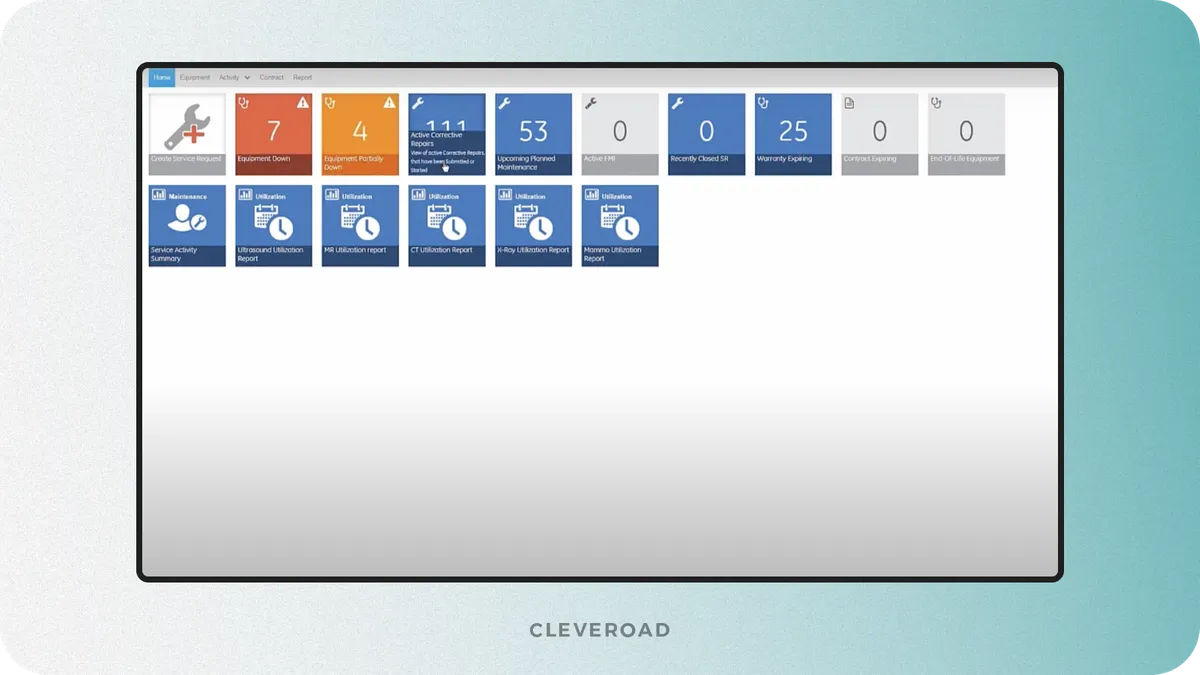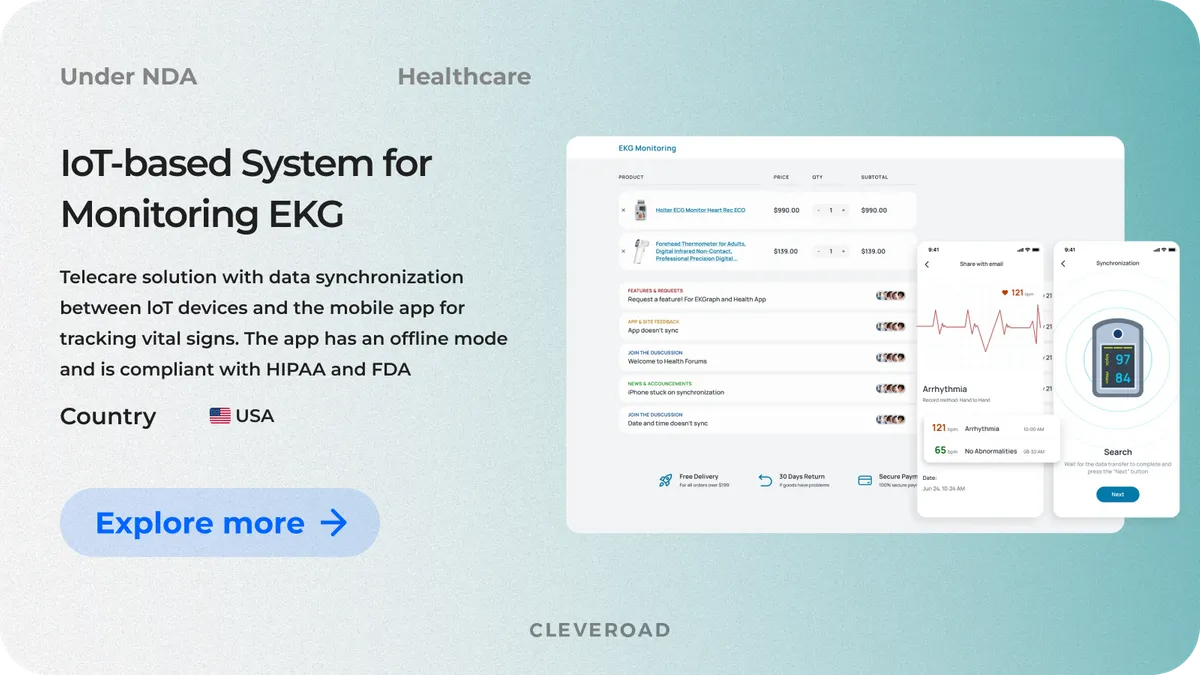AI and Automation in Healthcare: Business Opportunities for 2025
22 Apr 2025
15 Min
111 Views
Healthcare AI automation is an instrument that reshapes how we approach treatment and patient care. Whether it’s making diagnostics more accurate or just taking the paperwork burden off medical staff, it gives your practice the tools to work smarter. In this way, you can focus more on helping patients and delivering better care.
Cleveroad is an IT vendor with 13 years of experience in software development, and we have extensive expertise in developing AI-powered solutions for the healthcare domain. In this guide, you’ll learn about the use of AI automation in healthcare, define how AI tools are used by real-world organizations, and how you can start using AI automation for your practice.
What Is AI Automation in Healthcare?
AI and automation in healthcare involve utilizing tech solutions based on Artificial Intelligence (AI) to streamline time-consuming tasks, facilitate faster decision-making, and enhance patient outcomes. Think of it as providing healthcare teams with an extra set of hands and eyes that can analyze data, predict issues, and streamline operations more efficiently, eliminating the risk of manual errors. Basically, AI takes on the repetitive work so healthcare professionals can focus more on care.
Healthcare AI automation statistical insights
Let’s see what the results of implementing AI automation algorithms based on stats are:
- Cera, a UK-based healthcare provider, uses AI to predict 80% of health deteriorations in advance, leading to a 70% reduction in hospitalizations. Their fall prevention system also cuts patient falls by 20% by predicting 83% of them in advance.
- A 2024 study by Cornell University on age-related macular degeneration (AMD) showed that using AI assistance improved diagnostic accuracy significantly. The F1-score increased by over 50% in some cases, and clinicians completed their diagnoses up to 40% faster with AI support.
- According to the Financial Times, the smart hospital market, driven by AI and robotics, is expected to hit $148 billion by 2029, as more healthcare facilities adopt tech to improve patient care.
- Another study by Financial Times states that in 2024, $800 million was invested in AI-powered tools that summarize doctor-patient conversations and cut down clinician admin work. Companies like Microsoft, Amazon, and startups like Nabla are leading this charge.
All these stats prove that AI automation for healthcare is indeed worth noticing, and you may definitely need to try implementing this approach too.
Want to enhance your clinical flow with AI automation? We provide AI development services to help you create a modern, tech-rich and functional solution for your healthcare practice
Benefits of Implementing AI Automation within Your Healthcare Business
Let’s proceed, as now it’s time for you to disclose key advantages of AI medical automation.
Burnout detection via behavior analysis
AI systems can monitor behavioral patterns and workload trends among healthcare staff to detect early signs of burnout. These tools analyze variables like time spent per task, irregular working hours, and decreased response efficiency. By flagging such indicators, you can intervene before fatigue impacts care quality. This approach strengthens staff well-being and ensures consistent performance across shifts, which is one of the unobvious yet powerful uses of AI and automation in healthcare.
Smart clinical trial matching
AI-powered systems streamline the clinical trial enrollment process by scanning electronic health records, lab results, and genetic data to match patients with trials they qualify for. This eliminates the need for thorough manual screening and increases patient access to potentially life-changing treatments. It’s a game-changer for research teams, helping them speed up recruitment and improve trial accuracy, which is a core strength of healthcare AI automation when applied to precision medicine and research operations.
AI-driven supply chain forecasting
Managing inventory in hospitals is complex. Oversupply may lead to wasted resources, while shortages may cause compromised care. AI automation enables real-time monitoring of usage patterns and predicts future supply needs based on seasonal trends, appointment volumes, or local disease outbreaks. This helps avoid waste, reduce costs, and keep medical supplies on hand when demand surges. For operations teams, it’s a clear win, transforming supply chains from reactive to predictive.
Enhanced medical imaging in low-resource areas
In clinics where radiologists or high-end equipment are scarce, AI-powered imaging tools can support diagnostics by enhancing image quality, spotting abnormalities, and prioritizing urgent cases. These solutions work with basic imaging equipment and minimal bandwidth, enabling frontline workers to deliver accurate care where it’s needed most. This makes AI automation healthcare a critical asset in expanding access to medical diagnostics across rural or underserved communities.
Considering medical imaging software development? Check out our guide to learn how to build your own solution and empower it with AI
Actual Healthcare AI Automation Use Cases
To help you better navigate the subtleties of AI automation for healthcare, we’ve selected key vibrant use cases, along with examples of companies that successfully implemented AI automation.
Automated radiology image interpretation
AI in healthcare in the context of radiology can scan and interpret X-rays, CTs, and MRIs way faster than humans and catch things that doctors might miss, like small fractures or early signs of disease. It helps radiologists focus on the most critical cases first. One great example is Zebra Medical Vision. Their system scans for tons of conditions, from lung nodules to heart problems, making diagnoses faster, more accurate, and way less stressful for everyone involved.
Virtual health assistants for patient triage
No one likes spending hours in the ER only to find out it wasn’t urgent. AI-powered virtual health assistants chat with patients, ask smart questions about symptoms, and guide them to the right type of care, sometimes saving a trip to the doctor altogether. Buoy Health is doing this really well. Their approach to healthcare AI automation through virtual assistants feels like texting with a responsive nurse – someone who listens, understands your concerns, and quickly guides you on what to do next with clarity and confidence.
AI-powered EHR data extraction and summarization
Let’s be honest – EHRs can be a nightmare to dig through. Generally, doctors don’t have time to read pages of notes every time they see a patient. In this case, AI tools that pull out the key info and sum it all up are incredibly helpful. Amazon HealthScribe is a great example. It listens to doctor-patient conversations and writes up clear clinical notes automatically. This saves time, cuts down on errors, and gives doctors more time to spend on solving patients' requests.
Below you can examine the video from AWS New York Summit, representing Amazon HealthScribe:
AWS Summit New York: Amazon HealthScribe
Predictive maintenance for medical equipment
When a piece of medical equipment breaks down mid-shift, it’s a major headache – and it can delay important and even urgent care. AI helps prevent that by spotting early warning signs and scheduling maintenance before things go wrong. GE Healthcare has a tool that tracks how machines are doing in real time and flags issues early. It’s like having a mechanic in the cloud, making sure everything runs smoothly so hospitals can stay focused on patients, not repairs.
How to Find a Partner to Implement AI Automation Within Your Healthcare Practice
The best way to seamlessly implement AI healthcare automation into your medical business processes is to partner with an experienced IT vendor who can guide you through the technical side of implementation and help shape the right business strategy. Below is a short checklist to help you find the right vendor and build a successful collaboration.
Step 1. Identify repetitive clinical workflows for AI automation
Start by spotting the tasks your team does repetitively. This may be appointment scheduling, form processing, or billing follow-ups. These are the low-hanging fruit where automation makes a real difference. With AI and automation in healthcare, you can provide your staff with valuable break time from burnout-inducing admin work and let them focus more on patient care. Once you know what’s slowing you down, you can bring in the right tools to speed things up.
Step 2. Search for vendors with proven experience in AI automation
Don’t roll the dice on a company that’s never worked in healthcare. Instead, dig into vendors who’ve already delivered smart, secure solutions for healthcare and especially engaging AI automation. Look for those who understand patient data, clinical flows, and essential regulatory compliance needs. You can also research platforms like Clutch or Goodfirms to examine their past clients' feedback regarding expertise, collaboration flow, and more. Ask for examples or real use cases that match what you’re trying to build. Apart from tech proficiency, the right partner will help you eliminate actual pain points inside a clinic, hospital, or healthcare network.
Step 3. Put regulatory compliance awareness first
Make sure any vendor you consider takes compliance seriously. Ask how they handle HIPAA, GDPR, and other regulations tied to patient data. A great vendor will already have privacy baked into how they build software. They’ll also know what kind of audits and reporting are needed to stay above board. If they’re fuzzy on security, move on – because when it comes to health data, even small mistakes can become massive problems.
For example, Cleveroads experts are proficient in key healthcare laws and regulations, including HIPAA, GDPR, HL7, HITECH, PIPEDA, and TX-HB300, among others. Topped with extensive experience in healthcare processes autamation, we ensure that you receive top-tier assistance in medical software development, and, as a result, a robust, secure, reliable, and scalable solution.
At Cleveroad, we provide custom healthcare software development services, facilitating compliance with healthcare-specific data security and integrity regulations
Step 4. Evaluate the vendor’s past deliverables
Ask to see what they’ve shipped – and not just shiny mockups. Review real projects with measurable outcomes: faster workflows, better patient interactions, fewer errors. Can they walk you through how their technology works in the real world? If they’ve solved problems like yours before, chances are, they’ll do it again. A credible vendor proficient in AI automation healthcare will have a rich portfolio showing they can deliver in high-stakes environments.
- Check out our recent cases for eHealth in our portfolio.
At this point, we would like to introduce an extensive video feedback from one of our clients, Breanne Butler, Project Manager at Prime Path Medtech, a medical device manufacturing company. The project we’ve collaborated on is QSuite - an efficient FDA and ISO compliant Quality Management System that improved clients’ services for tracking certification flow and saved up to 20% in gross customer's expenditures
Breanne Butler, Client Liaison Officer at Prime Path Medtech™ provide feedback about collaboration with Cleveroad
Step 5. Check the vendor’s collaboration approach
Selecting a vendor with a flexible cooperation model is essential for aligning the project structure with your business needs. For example, Cleveroad offers three engagement options: IT staff augmentation, Dedicated Team, and Project-Based collaboration. This flexibility allows you to scale resources, manage budgets efficiently, and maintain control over the development process. Whether you need full project ownership or support for your in-house team, these models provide a convenient, tailored way to build healthcare AI automation solutions in healthcare.
Step 6. Assess vendor’s approach to cooperation transparacy
Transparency in collaboration is key to avoiding misunderstandings and ensuring a smooth development process. A vendor that embraces clear communication and iterative delivery builds trust and keeps stakeholders aligned. Cleveroad follows the Agile software development methodology, providing regular updates, sprint reviews, and progress tracking. This structured yet adaptive approach ensures that healthcare AI automation projects remain on time, within scope, and responsive to evolving needs – ultimately benefiting you with predictable results and a transparent partnership.
Potential Drawbacks of Healthcare AI Automation
Implementing AI automation in healthcare can come with its own set of challenges. Below, we’ve outlined the most critical pitfalls you might face and how Cleveroad’s experts can help you navigate them effectively and reduce the risk of failure.
Data privacy and security vulnerabilities
Medical AI automation processes massive amounts of sensitive patient data. Without strict protocols, this data can be exposed to breaches or misuse, putting organizations at legal and ethical risk. With the risk of frequent cyberattacks in healthcare, providers must comply with HIPAA, GDPR, and other regulatory standards to safeguard PHI (Protected Health Information) and facilitate top-tier healthcare data security. Encryption, secure APIs, and role-based access are all must-haves, but implementing them right requires deep technical know-how.
Cleveroad’s solution: Cleveroad ensures airtight security by building solutions in compliance with HIPAA, GDPR, FHIR, HL7, HITECH, PIPEDA, CDA, etc. Our engineers use end-to-end encryption, OAuth 2.0, PHI, data residency and retention, and secure cloud environments like AWS and Azure to protect data both in transit and at rest. Cleveroad’s DevSecOps practices embed security at every stage of development, ensuring you can safely scale your AI systems without risking patient data.
Additionally, Cleveroad is an IT vendor certified with ISO/IEC 27001:2013, meaning that we provide medical software services in alignment with leading world security practices.
Risk of algorithmic bias in patient care
AI systems can unintentionally reflect biases found in the training data, leading to unequal treatment recommendations based on race, gender, or geography. These biases impact diagnostic accuracy, treatment prioritization, and clinical decision-making, leading to disparities in care and outcomes.
Cleveroad’s solution: We use diverse and representative datasets when designing AI models to reduce the risk of bias. Our data science team applies fairness-aware machine learning methods and model auditing tools to ensure ethical outcomes. Real-time analytics dashboards and explainable AI models enable medical staff to interpret decisions and intervene when needed, combining algorithmic insights with human clinical judgment.
How machine learning in healthcare can help you tune the workflows of your medical practice? Check out our guide to learn more
High implementation and maintenance costs
Solutions engaging AI automation for healthcare often require a high upfront investment in infrastructure, software, medical staff training, and integration with existing systems. Smaller clinics and hospitals may struggle with cost of AI in healthcare, especially when ongoing maintenance, model retraining, and updates are factored in.
Cleveroad’s solution: Cleveroad optimizes cost-efficiency by offering Proof-of-Concept (PoC) development using modular system architectures. A PoC enables the deployment of a small-scale solution to test the real-world performance of the software, before committing to full-scale implementation. This approach allows for data-driven validation and risk reduction prior to broader rollout. We also use cloud-based infrastructures (e.g., AWS, GCP) and open-source ML frameworks (like TensorFlow and PyTorch) to reduce licensing and server costs.
Overdependence on automated decision-making
Even though AI tools improve speed and consistency, overreliance can lead clinicians to blindly trust machine-generated outputs. This undermines critical thinking and may compromise patient safety if the system fails or produces inaccurate results. A healthy balance between automation and human oversight is vital.
Cleveroad’s solution: We mostly focus on building AI-powered systems with human-in-the-loop design, ensuring your medical experts remain central to the decision-making process. At Cleveroad, we implement explainable AI features, intuitive UX design, and customizable rule engines that allow medics to review, override, or adjust recommendations.
Cleveroad – Your Reliable Partner for Implementing AI Automation in Healthcare
Cleveroad is a healthcare software development company with 13+ years of experience in assisting medical businesses refine their care with robust software solutions. We specialize in providing various MedTech services, including custom healthcare software development, legacy systems modernization, AI/ML in healthcare, and more.
Apart from these we implement a wide range of third-party integrations for healthcare solutions, including Kareo, MemoraHealth, Truepill, DailyMed, Twilio, DrChrono, Stripe, Eligible, etc.
We deliver various types of medical software from scratch, including EHR/EMR, Telemedicine platforms, e-prescription solutions, medical billing software, Remote Patient Monitoring(RPM), medical imaging and visualization software, etc.
Here’s what benefits you’ll obtain by collaborating with us:
- Certified partner. Cleveroad holds ISO/IEC 27001:2013 for information security and ISO 9001:2015 for quality management, key certifications for building secure, regulation-compliant healthcare solutions. This means your platform is developed to safeguard sensitive patient data and meet strict industry standards.
- End-to-end development. Cleveroad delivers end-to-end AI automation in healthcare, streamlining the entire process – from planning and evaluating tasks to creating, training, and integrating AI models into medical software. Whether enhancing existing systems or building new solutions, we ensure seamless implementation. Post-release, we provide ongoing support and model refinement to keep your AI-driven workflows accurate and efficient..
- Expert healthcare-focused development team. You’ll access 250+ skilled in-house professionals, 75% of whom are seniors and middle-level specialists. Our cross-functional team, including engineers, QA, PMs,and analysts, knows how to handle the complexity of healthcare apps, from medical APIs to EHR integrations.
- Flexible collaboration. You can choose the most suitable model for your healthcare organization: IT staff augmentation boosts your team with niche AI expertise, dedicated teams handle full-cycle development with domain focus, and project-based cooperation ensures end-to-end delivery under fixed scope – each model provides alignment with your specific project needs.
To prove our experience in Healthcare software development, we’d like to represent our recent case - IoT-based system for monitoring EKG and blood oxygen level.
A US-based medical device manufacturer turned to Cleveroad to bring its IoT-powered ECG monitors and pulse oximeters into the digital space. The company aimed to build a mobile app that would let users track heart and oxygen levels in real-time and needed a robust e-commerce platform to sell devices directly to customers. Alongside this, they envisioned creating a professional community space for doctors and patients to connect.
Our team tackled the project by delivering mobile apps for iOS and Android, equipped to sync seamlessly with the company’s devices via Bluetooth. To meet strict US healthcare regulations, we embedded AES-256 encryption and HIPAA-compliant data storage protocols. Beyond the app, we developed an e-commerce module and launched a WordPress-based medical forum integrated with the mobile platforms, turning the solution into a full-service digital ecosystem.
As a result, the client received a compliant, scalable mobile solution that reliably connects to their ECG and pulse oximeter devices. Doctors and patients now benefit from user-friendly, at-home health tracking, while the new e-commerce functionality and medical forum strengthened the brand’s digital presence, opened new revenue channels, and built trust within the professional community.
Start AI automation with our domain experts
Our team with deep knowledge in eHealth and the medical regulatory landscape will help you automate routine clinical tasks with extensive capabilities of Artificial Intelligence
AI in healthcare refers to the integration of artificial intelligence technologies into clinical and administrative workflows to streamline processes, reduce manual tasks, and enhance decision-making. As more providers learn how AI can support their day-to-day operations, the number of AI applications continues to grow. From diagnostics to documentation, the potential of AI is transforming how medical data is analyzed and used. Tools like AI chatbots are also enhancing patient engagement and communication, while data-driven insights improve overall health management across the care environment.
AI automation brings a wide range of advantages, including improved diagnostic accuracy, reduced clinician workload, faster administrative processes, and enhanced patient engagement. With the application of AI tools, healthcare systems can streamline repetitive tasks, allowing healthcare providers to focus more on direct patient care. These AI solutions not only boost operational efficiency but also support better decision-making. As the future of AI continues to evolve, the role of AI technologies will become even more integral in supporting healthcare professionals and improving patient outcomes across the board.
AI automation is used in many areas of the healthcare industry, from improving workflows in healthcare like automating radiology image interpretation and AI in clinical documentation to streamlining patient triage with virtual assistants.
It also supports:
- Supply chain forecasting
- Predictive maintenance for medical equipment
- Matching patients to clinical trials
These applications make operations smarter and more scalable across the entire healthcare system. With the right integration of AI, a health system can dramatically boost efficiency and deliver higher-quality care at scale.
Despite its potential benefits, AI automation in healthcare comes with challenges such as data privacy concerns, potential AI algorithm bias, high implementation costs, and the risk of overreliance on automated decision-making. To transform healthcare effectively, organizations need to focus on strong governance, compliance with healthcare regulations, and thoughtful model training. Choosing the right tech partner is key. AI can help enhance healthcare delivery, but only when implemented with a clear strategy and full alignment with regulatory and ethical standards.

Evgeniy Altynpara is a CTO and member of the Forbes Councils’ community of tech professionals. He is an expert in software development and technological entrepreneurship and has 10+years of experience in digital transformation consulting in Healthcare, FinTech, Supply Chain and Logistics
Give us your impressions about this article
Give us your impressions about this article



